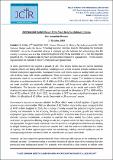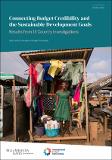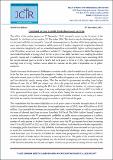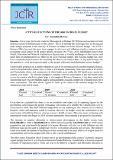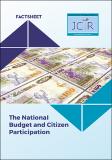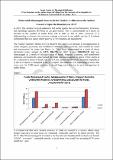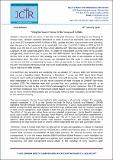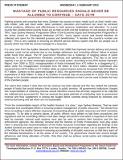Browsing Public Finance Management by Author "Jesuit Centre for Theological Reflection"
Now showing items 1-12 of 12
-
2020 National Budget Doesn’t Offer Much Relief to Ordinary Citizens
Jesuit Centre for Theological Reflection (2019-10-01)In 2020, government has targeted a growth of 3%. This simply means that the current hardships majority citizens are facing will continue. Challenges such as lack of access to basic nutritious food, limited employment ... -
APRM in Zambia
Jesuit Centre for Theological Reflection (2009-03)There are questions that many Zambians have! But not many of us have good answers! Not only do Zambians ask questions about governance, but so do the citizens of so many other African countries. And that is why there is - ... -
Connecting Budget Credibility and the Sustainable Development Goals : Results from 13 Country Investigations
Jesuit Centre for Theological Reflection (2022-10-30)Budget credibility is a challenge found in many developing countries. It is defined as the difference between the budget that is approved by a country’s legislature, the actual expenditures spent, and revenues collected ... -
Continued Increase in Public Funds Abuse/Waste Worrying
Jesuit Centre for Theological Reflection (2017-11-08)Zambia has many developmental challenges to continue on the path of wasteful use of public resources. In the last few years, government has struggled to balance its incomes with expenditure partly due to reduced economic ... -
Debt Resource Monitoring Manual
Jesuit Centre for Theological Reflection (2008)The achievements made so far in the campaign for debt cancellation need to be complemented by prudent management and utilisation of debt resources in the post HIPC era. In order to facilitate transparency and accountability ... -
Domestic Resource Mobilisation For Sustainable Development
Jesuit Centre for Theological Reflection (2008)To ensure that there is equity in bearing the tax burden. The tax burden in Zambia is borne largely by about 500, 000 workers in the formal sector. There is need to ensure that equity prevails where all contribute to the ... -
Domestic Resource Mobilisation For Sustainable Development
Jesuit Centre for Theological Reflection (2014)TPIN stands for Tax Payer Identification Number. It can be likened to a National Registration Card (NRC) number for a Zambian citizen. It is the official ten (10) digits number that ZRA issues to a Tax registered individual ... -
JCTR’s Reflections on the 2020 National Budget
Jesuit Centre for Theological Reflection (2020)The JCTR’s Kasama Office has over the years been engaged in advocacy and lobbying of policy makers in order to promote social justice for all people epically the poor. On 4th July, 2019, stakeholders drawn from Health, ... -
National Budget And Citizen Participation
Jesuit Centre for Theological Reflection (2019-11-05)A budget is a plan for future income and expenditure that is used as guideline for spending, saving or investing.The budget cycle refers to and includes all the processes, procedures and activities by which government ... -
Press Statement on The Auditor General’s Report on The Accounts of The Republic For The Financial Year Ended 31St December, 2013
Jesuit Centre for Theological Reflection (2013)The Report is rather gloomy and bleak in respect of the utility of public resources pointing to prevalence of resource disutility in the public service. There are many questions than answers regarding the operation of the ... -
Tilting The Scale in Favour of Borrowing And it’s Risks
Jesuit Centre for Theological Reflection (2020-01-15)The paper talks about the rise of Zambia’s external debt over the past few years. According to the Ministry of Finance data, Zambia’s domestic debt stock in terms of securities and bonds rose in 2011. Against this back ... -
Wastage Of Public Resources Should Never Be Allowed To Continue
Jesuit Centre for Theological Reflection (2012-02-01)In a poor country like Zambia where poverty levels are as high as 63% and the incidence of rural poverty as high as 78%, every ngwee counts and should therefore be collected and spent for the intended purpose and beneficiaries. ...

